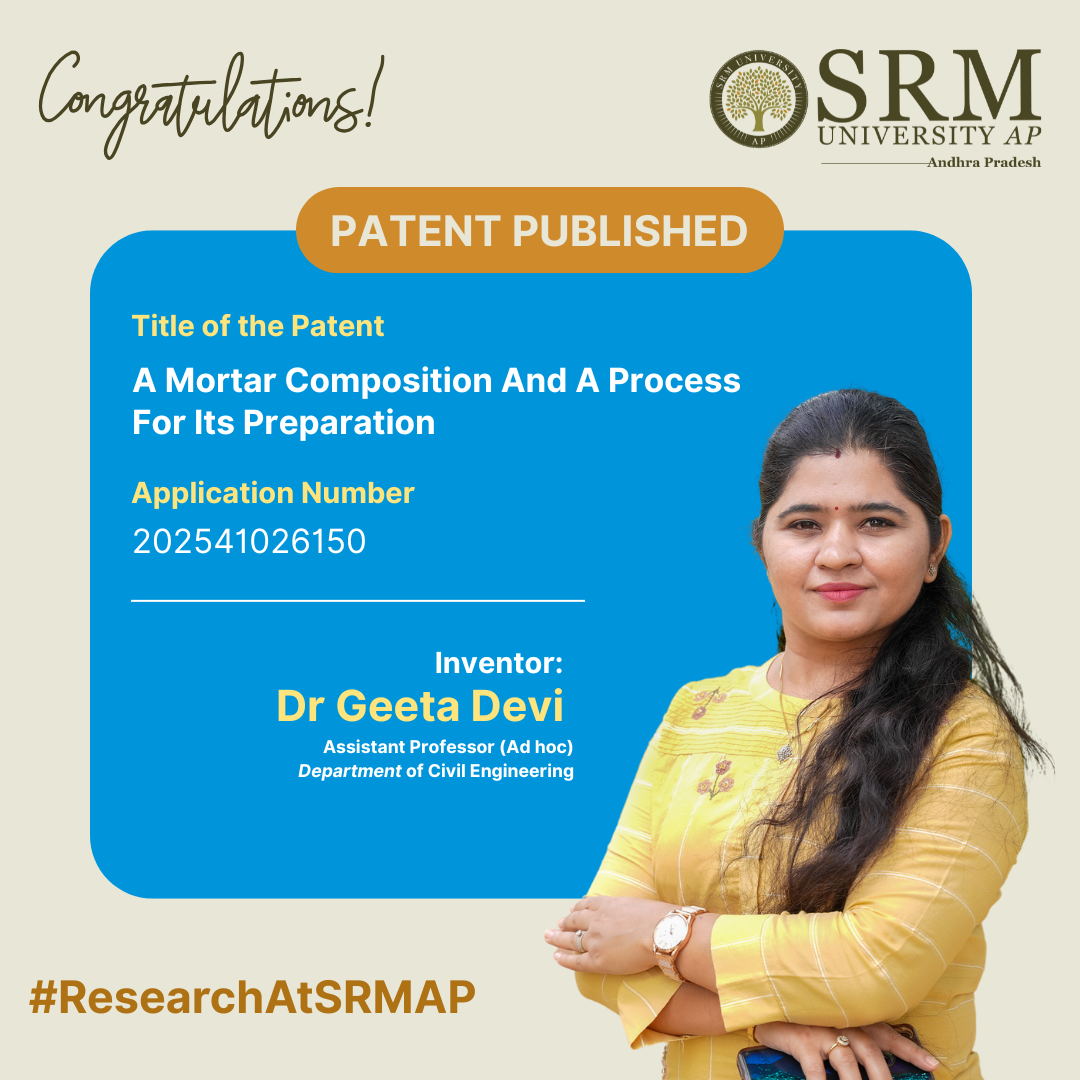 In a significant breakthrough for sustainable construction, a new and improved version of traditional cement mortar has been developed by Dr Geeta Devi, Assistant Professor, Department of Civil Engineering along with Dr Mohanraj Rajendran, Assistant Professor, and Mr Lokeshwaran Murugan, M.Tech Scholar have filed and published a patent titled “A Mortar Composition and a Process for its Preparation”.
In a significant breakthrough for sustainable construction, a new and improved version of traditional cement mortar has been developed by Dr Geeta Devi, Assistant Professor, Department of Civil Engineering along with Dr Mohanraj Rajendran, Assistant Professor, and Mr Lokeshwaran Murugan, M.Tech Scholar have filed and published a patent titled “A Mortar Composition and a Process for its Preparation”.
This enhanced mortar becomes stronger and more durable while setting faster to reduce construction time. The improved formula absorbs less water, increasing its resistance to moisture and weather damage. It also provides better workability, making it easier to apply on construction sites. This innovation saves both time and cost in construction projects while delivering longer-lasting structural integrity, making it a valuable advancement for the building industry.
Abstract
The research presents an innovative mortar composition and a simple, scalable process for its preparation, designed to improve construction quality and efficiency. This innovative formulation incorporates polyester fibers (Recron 3s). It employs water with controlled Total Dissolved Solids (TDS) levels, resulting in remarkable improvements in compressive and flexural strength, faster setting times, and reduced water absorption. This novel formulation demonstrates up to 21.5% improvement in strength and offers a practical, eco-friendly solution for modern construction needs.
A new and improved version of traditional cement mortar has been developed by adding Recron 3s polyester fibers to the mix and controlling the mixing water quality through Total Dissolved Solids (TDS) level adjustments. This enhanced mortar becomes stronger and more durable while setting faster to reduce construction time. The improved formula absorbs less water, increasing its resistance to moisture and weather damage, while also providing better workability that makes it easier to apply on construction sites. This innovation saves both time and cost in construction projects while delivering longer-lasting structural integrity, making it a valuable advancement for the building industry.
Practical Implementation & Social Impact
This new mortar composition is particularly tailored for practical use in real-world construction, including residential buildings, educational institutions like schools and colleges and infrastructure projects like bridges, pavements and stable structures for harsh environments. Some of the key performance improvements are the enhanced durability giving long-term strength, Faster setting time aiding quicker construction and better water resistance, minimising damage and deterioration.
Using this mortar composition in construction could reduce maintenance and repair costs by extending the lifespan of structures. It also supports sustainable practices by utilising recyclable polyester fibres (Recron 3s). The ability to utilise non-potable water with controlled Total Dissolved Solids (TDS) levels makes the process both eco-friendly and cost-effective in regions with limited access to clean water resources. This innovation contributes meaningfully to Sustainable Development Goals (SDGs) in infrastructure and housing, particularly in resource-limited or climate-sensitive areas.
Future Research Plans
- Scaling the mortar production for industry use.
- Exploring nano-materials and industrial by-products to further improve mortar performance and reduce environmental impact.
- Testing the composition under extreme climate conditions and integrating it with 3D printing in construction.
- Investigating automated mixing systems and AI-based optimisation of mix design for site-specific applications.
Research Team
Dr Geeta Devi – Assistant Professor, SRM University-AP
Dr Mohanraj Rajendran – Assistant Professor, SRM University, Delhi NCR
Mr Lokeshwaran Murugan – M.Tech Scholar, SRM University, Delhi NCR

